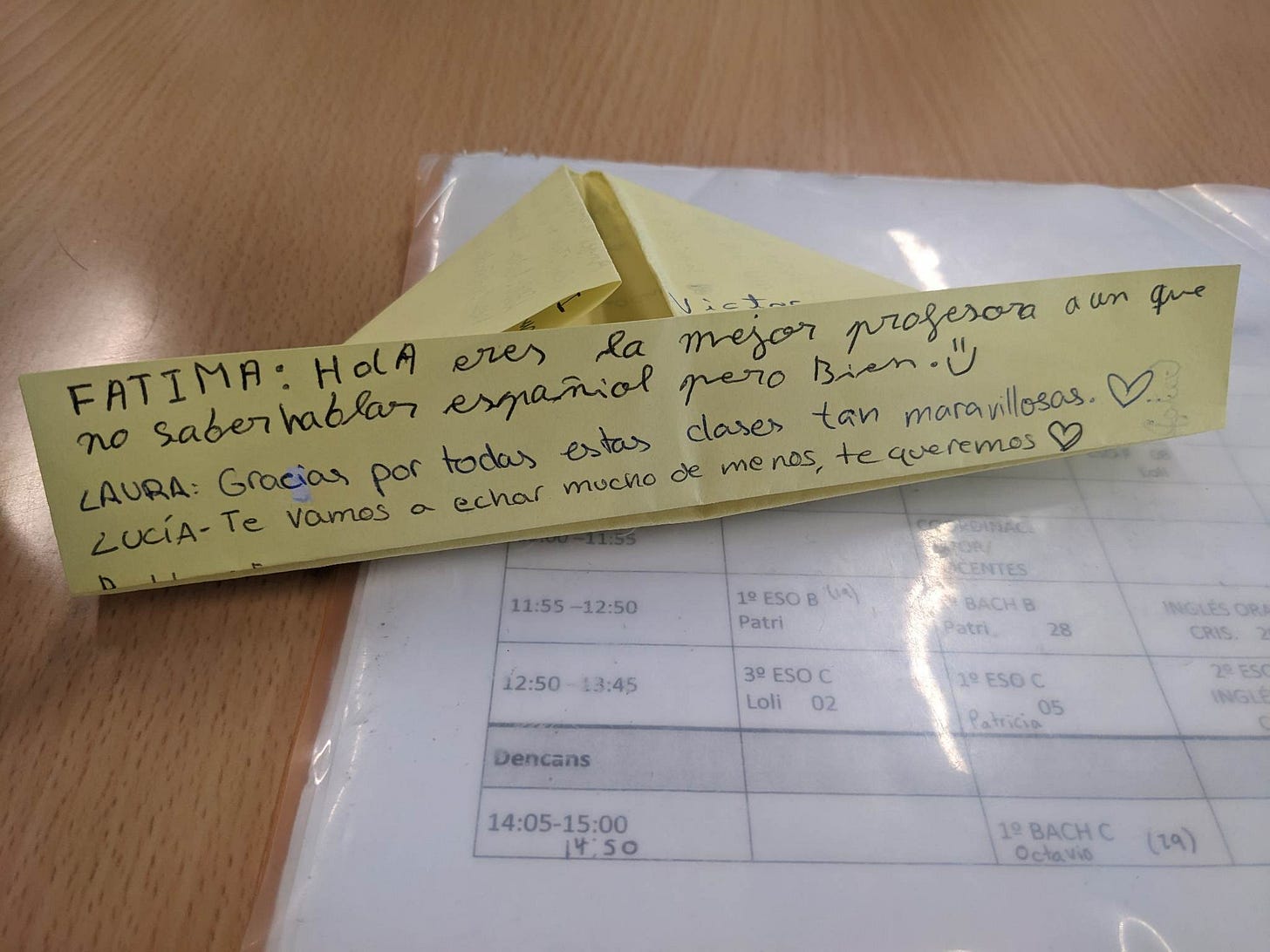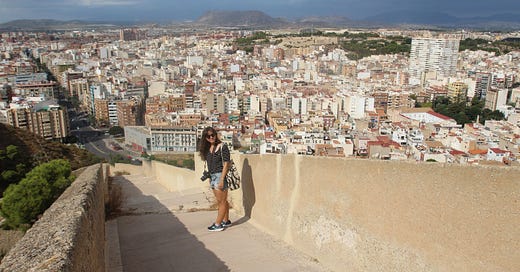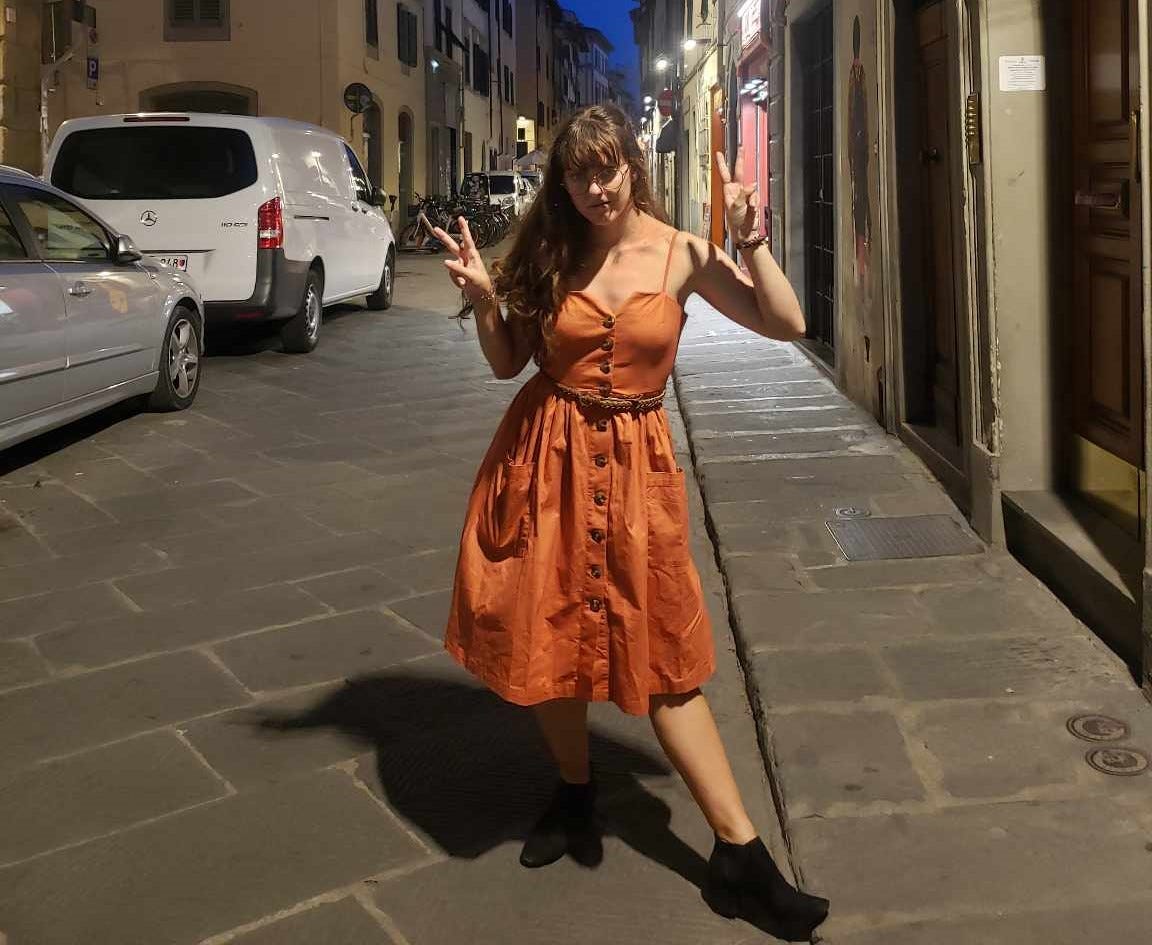“I’m just so stressed about my Spanish exam,” I told my grandmother, as we chatted in her living room.
“What exactly will happen if you don’t pass it?” she asked.
“Well,” I paused. “Um. Nothing. But I would have done all this studying for no reason!”
I knew that that wasn’t true. As friends and family had reminded me dozens of times, having done all this studying had ostensibly made me better at Spanish, which was the real goal here. You know, being able to use and understand a language. Or whatever.
I wanted to pass a Spanish exam because, like many human beings, I need external validation to feel worthy.1 For instance, I did well on exams growing up because I am good at memorizing information without internalizing it. Did I ace my history tests in high school? Oh yeah. Can you ask me anything about history? Please don’t! I memorized that information long enough to pass a standardized test and then I let it all leak out of my brain like when you empty all the melty water out of the ice chest at the end of the Fourth of July. Not very useful in the long term, I have to say.
Growing up, I cared more about getting a good grade than about learning anything. As I’ve gotten older, I’ve learned to recognize and push back against that tendency, but it runs deep. And there are benefits to having certifications and milestones to mark your progress, sure. So, there I was, stressing about a Spanish test that I had voluntarily signed up to take.
A year ago, I moved to Spain to spend an academic year as an English language teaching assistant. I’d been taking Spanish classes for a couple of years, on and off, but I was determined to really level up my skills by living among the Spaniards.
Specifically, I wanted to reach the “C1” language level in the Common European Framework of Reference for Languages. There are six levels, from lowest to highest: A1, A2, B1, B2, C1, C2. A1 is like when you can say your name and where you live. C2 is like being a native speaker. C1 is the step below that.
I am not good at learning languages, and it took me sooooOOOOooOOoo long to get to a level where I felt comfortable trying to speak Spanish at all. But I thought, “I’ll be immersed! I’ll pick up Spanish like a sponge just by being there!”2
I decided I’d take the Spanish exam, which is called the DELE exam, toward the end of my school year in Spain, in May. But, much to my shock and dismay, I had not just absorbed all the intricacies of the language through my pores when I’d landed in Spain, and progress, while definitely there, had been slower than I thought.

So, in the springtime, I started to think: Should I dream big and sign up for C1, or play it safe and go with B2, one level below? After waffling back and forth for several weeks and consulting with my Spanish teacher, I decided to sign up for the B2 exam. It would mean less stress while I was traveling around for my final months in Europe, and that I was more likely to get a passing score out of this exam I would be, after all, paying to take.
So, that was that. I’d sign up for B2, and take the exam on May 15.
I had made my decision.
I had my goal set.
I had, it turns out when I went to sign up in March, missed the registration deadline by ONE DAY.
After cursing a lot to myself and then whining about this to my Spanish teacher, we landed on an unorthodox idea: I, the English-speaking American, could take my Spanish aptitude test in… Italy. The next exam was in July, and I was planning to be in Italy for July and August. Plus, it was in early July, which meant I wouldn’t need to spend my whole summer in Italy bent over grammar exercises.
At the time (still March), July was about a million years away. So, I thought about it for a few days and decided to go for it: I’d sign up for the C1 exam. I had two extra months to study, after all.
When July arrived, approximately four seconds later, I was sure I’d made a huge mistake. I’d been poring over my grammar textbook and listening to Spanish podcasts and slowly making my way through a novel in Spanish. I studied on trains, on airplanes, in Airbnbs, in my mom’s guest room, in the dining room table at Jeff’s mother’s house and in our friends’ attic in Spain. I had Zoom class with my Spanish teacher from the airport in Barcelona, from my aunt’s basement, from a studio apartment in Italy. And on and on.
But I’d also been busy, had studied less than I’d hoped, felt unprepared. Regardless, it was go time. The exam, which stretched over two days and began with me struggling to get into the building and find the right floor, is a blur of stress. But here are some highlights.
For the oral section, I had to (among other tasks), read an article and discuss it with an interviewer. The article was about how and why young people are getting their drivers licenses less often than in the past. “What do you think the city of the future looks like?” she asked me. “Will people use cars? Buses? Patinetas?”
I had heard the word “patineta” many times before, but I could not for the life of me remember what it meant3. Whatever it was, it definitely wasn’t going to be part of my answer, because then she might as me a follow-up question. I said something or other about public transportation. then woke up in a cold sweat later that night realizing I had said even “public transportation” incorrectly.
I was probably the least worried about the listening section. It’s the easiest to practice because you can, say, listen to a Spanish podcast while you’re driving or walking. While I can’t understand everything all the time, I understand a lot a lot of the time. In the exam room, it felt like the opposite. What I hadn’t practiced enough was listening and completing an exercise at the same time. And one of the recordings was so static-y it dredged up this memory Dr Seuss’ “The Lorax” that I didn’t know I had.
For one of the writing tasks, I had to listen to a recording in which a woman said a lot of numbers and statistics, most too quickly for me to catch. In my effort to write around the spaces where I should probably be including numbers, I ended up writing wayyy too much. By that point, my brain felt like shredded cheese that was starting to melt, so I just left it.
After the exam, a girl said something to me in Italian, and I sounded like a huge nerd when I responded in Spanish, like I was dead set on practicing, even though the exam as over. “Sorry,” I said, in Spanish. “I’m American. I don’t speak Italian, only Spanish.” “Oh, do you speak it well, though?” she asked. I laughed and told her that, after that exam, it certainly didn’t feel like it.
Here is the thing: I knew I hadn’t passed. But I was surprised to realize that rather than hating myself, I actually still felt proud of myself for trying. I felt like I had spent all this time improving, in the end. I even felt, in fact, like I deserved a gelato.
I put the test out of my mind and spent the summer in Italy. I ate, I prayed, I loved. I told an Italian that “Eat Pray Love” gets sort of satirized but I think it’s actually an insightful story, sue me. And he watched the movie and he liked it SO THERE.
In September, back in the U.S. and recovering from how much I missed Italy, I got the absolutely bonkers news that I actually, by some miracle, did pass the exam. Barely, and I mean baaaarely: In one category I got the lowest possible passing score. But it’s a pass/fail scoring system and I TECHNICALLY PASSED. I have checked a dozen times, just to make sure.
I want to emphasize something here. I am still one of those people who is better at exams than at real life. I have several friends who haven’t passed any sort of exam in their second language and speak/understand/communicate WAY better than I do. I still have a long way to go to feel comfortable with things like the subjunctive. And I rarely (as I’d hoped to by this point) think or dream in Spanish.
Still: I said I wanted to pass, and I passed. So, I guess that’s something.
I DO NOT THINK YOU SHOULD TAKE ADVICE FROM ME, but if I can pass this exam, you probably can too. I spent a lot of time reading other people’s advice about language learning along the way. So, if you are interested in a DELE exam or just learning Spanish, here are some of my favorite resources.
Everything Spanish Language Coach does. I listened to César’s intermediate and advanced podcasts regularly. I did his affordable and wonderful online course. His work helped me with my Spanish so much. Would consider naming a child after him.
My Spanish teacher recommended this grammar book, and it pretty much became my bible for awhile.
Spanish With Vicente on YouTube was really great for reviewing grammatical concepts and also learning specific information about and tips for the DELE exam format. I got really into his channel just a month or two before my exam, and wish I’d found him earlier. Same with a por el DELE!
GOOD PEOPLE
Luis, who has been meeting with me most weeks for over two years(!!) to help me with my Spanish while I teach him an English phrase every six months or so. He has sent me countless resources, helped me overcome my fear of speaking and become a true friend. Zero chance this would have happened without him.
Marie-Lou, my coworker in Spain, who gave me so many opportunities to practice, issued the gentlest corrections for my many errors, and made our little town feel like a home by being such a fun and kind and smart friend.
Pilar, the best Spanish tutor ever; so funny and helpful and supportive and brilliant. Could not imagine a better teacher.
Paco and Cristina, Fran and Maria Jose, to whom I am forever indebted for their hospitality and kindness and patience with my Spanish. Os echamos de menos mucho.
Question of the Week: What’s the most pleasantly surprised you’ve ever been?
Recommendation of the Week: Cannot stop watching Delaney Rowe’s Instagram reels of characters like “absolutely insufferable female lead of an indie movie” and “your friend who won’t just admit they’re not gonna come.”
Healthy? Probably not! Avoidable? Probably not that, either!
This is not true, especially if you live with someone who speaks English and have a remote job all in English and have an in-person job teaching English
Scooter!!! It means scooter!!!






Congratulations! Amazing news! Also I definitely think there's something uniquely stressful about something you've actually volunteered yourself to do.
Way to put yourself out there and try! Congratulations!